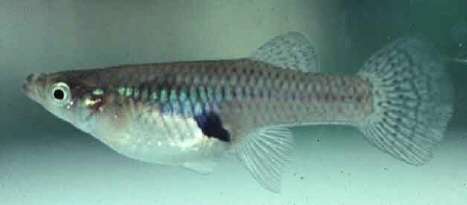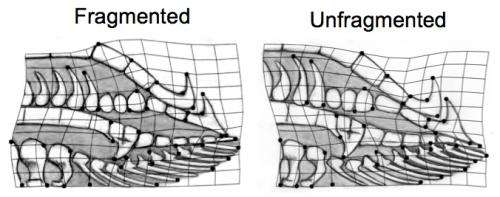Mosquitofish genitalia change rapidly due to human impacts

The road that connects also divides. This dichotomy – half-century-old roads connecting portions of Bahamian islands while fragmenting the tidal waters below – leads to rapid and interesting changes in the fish living in those fragmented sections, according to a new study from North Carolina State University.
NC State Ph.D. student Justa Heinen-Kay and assistant professor of biological sciences R. Brian Langerhans show, in a paper published in the journal Evolutionary Applications, that the male genitalia of three different species of Bahamian mosquitofish (Gambusia) living in fragmented waters differ markedly from the genitalia of fish living in unfragmented waters.
Fragmentation limits the number of mosquitofish predators, which appears to have a link to the shape of the male fish's genitalia. Fish coexisting with predators in unfragmented areas have bonier and more elongated gonopodium tips than fish living without threat of predation in fragmented areas. The gonopodium is the sperm-transferring organ in these livebearing fish.
"This study shows that human-induced habitat alteration results in changes in fish genitalia in just 35 to 50 years – the time elapsed since the fragment-causing roads were built," Heinen-Kay said. "While we expected to see some changes, we were surprised to see the consistency with which each species changed in accordance with our predictions based on earlier work that focused on how ecological factors, such as predation, affected the evolution of male genitalia over the course of thousands of years."
The authors said that these findings indicate that sometimes the impacts of human activities on the traits of organisms can be predictable, suggesting that management, restoration and conservation efforts could be useful.
Langerhans added that the study could provide particular insight into speciation, or how different species develop.

"Because genitalia have an obvious and direct influence on reproduction, these findings beg the question of whether human-induced environmental change might facilitate speciation. As populations become more and more different in their genital morphology, their ability to interbreed can decline, leading to speciation," Langerhans said. "How common this sort of rapid change in genital shape might be in other species, and its consequences for the formation of new species, are some of the questions we'll ask in future studies."
More information: "Human-caused habitat fragmentation can drive rapid divergence of male genitalia" November 2013, Evolutionary Applications. DOI: 10.1111/eva.12223
Provided by North Carolina State University





















